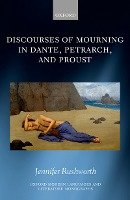This book brings together, in a novel and exciting combination, three authors who have written movingly about mourning: two medieval Italian poets, Dante Alighieri and Francesco Petrarca, and one early twentieth-century French novelist, Marcel Proust. Each of these authors, through their respective narratives of bereavement, grapples with the challenge of how to write adequately about the deeply personal and painful experience of grief. In Jennifer Rushworth's analysis, discourses of mourning emerge as caught between the twin, conflicting demands of a comforting, readable, shared generality and a silent, solitary respect for the uniqueness of any and every experience of loss. Rushworth explores a variety of major questions in the book, including: what type of language is appropriate to mourning? What effect does mourning have on language? Why and how has the Orpheus myth been so influential on discourses of mourning across different time periods and languages? Might the form of mourning described in a text and the form of closure achieved by that same text be mutually formative and sustaining? In this way, discussion of the literary representation of mourning extends to embrace topics such as the medieval sin of acedia, the proper name, memory, literary epiphanies, the image of the book, and the concept of writing as promise. In addition to the three primary authors, Rushworth draws extensively on the writings of Sigmund Freud, Julia Kristeva, Jacques Derrida, and Roland Barthes. These rich and diverse psychoanalytical and French theoretical traditions provide terminological nuance and frameworks for comparison, particularly in relation to the complex term melancholia.

